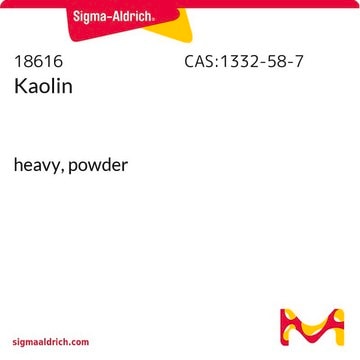60609
Kaolin
tested according to Ph. Eur.
Synonym(s):
Kaolinum ponderosum, Aluminum silicate hydroxide, Bolus, Hydrated aluminum silicate
Sign Into View Organizational & Contract Pricing
All Photos(1)
About This Item
Linear Formula:
~Al2Si2O5(OH)4
CAS Number:
EC Number:
MDL number:
UNSPSC Code:
11111803
NACRES:
NA.25
Recommended Products
Agency
USP/NF
tested according to Ph. Eur.
Quality Level
form
solid
application(s)
pharmaceutical (small molecule)
InChI
1S/2Al.O5Si2.2H2O.2O/c;;1-6(2)5-7(3)4;;;;/h;;;2*1H2;;/q2*+1;-2;;;;
InChI key
NLYAJNPCOHFWQQ-UHFFFAOYSA-N
Looking for similar products? Visit Product Comparison Guide
Application
- Cellulose fibres enhance the function of hemostatic composite medical sealants.: This study highlights the role of kaolin in the development of composite medical sealants, demonstrating its efficacy in improving hemostatic functions, crucial for surgical applications and wound management (Gilboa E et al., 2024).
- Development and characterization of a composite material with geopolymer matrix obtained by incorporation of microparticles from plastic bottles.: Investigates the use of kaolin in developing sustainable composite materials, showcasing its utility in recycling and environmental conservation (Bayiha BN et al., 2024).
- Isolation and characterization of Stenotrophomonas pavanii GXUN74707 with efficient flocculation performance and application in wastewater treatment.: Details the use of kaolin as a flocculating agent, enhancing microbial wastewater treatment, vital for environmental biotechnology and public health (Qin S et al., 2024).
- Sustainable Coating Materials: Exploring the Influence of Adjuvants on Kaolinite Suspension with Insights from Five Local Mining Clays.: This research assesses the impact of kaolin and other clays on the development of sustainable coating materials, contributing to advancements in materials science and eco-friendly technologies (Chanthaset N et al., 2024).
Storage Class Code
11 - Combustible Solids
WGK
nwg
Flash Point(F)
Not applicable
Flash Point(C)
Not applicable
Personal Protective Equipment
dust mask type N95 (US), Eyeshields, Gloves
Choose from one of the most recent versions:
Already Own This Product?
Find documentation for the products that you have recently purchased in the Document Library.
Customers Also Viewed
Dong Kun Yang et al.
Journal of veterinary science, 9(4), 381-385 (2008-12-02)
Recent global warming trends may have a significant impact on vector-borne viral diseases, possibly affecting vector population dynamics and disease transmission. This study measured levels of hemagglutination-inhibition (HI) antibodies against Japanese encephalitis virus (JEV) and neutralizing antibodies against Akabane virus
Ching-Wei Wu et al.
Journal of hazardous materials, 244-245, 412-420 (2013-01-01)
The process of mechanical milling has been found to effectively stabilize heavy metals in municipal solid waste incinerator (MSWI) fly ash, as well as to restrain the evaporation of heavy metals during thermo-treatment. This method is adopted in this study
Kenji Inaba et al.
The journal of trauma and acute care surgery, 74(2), 538-545 (2013-01-29)
The purpose of this study was to evaluate the long-term efficacy and safety of kaolin- and chitosan-based hemostatic agents for hemorrhage control in a 14-day survival, damage-control swine model of Grade IV liver injury. A total of 48 anesthetized pigs
Don Johnson et al.
U.S. Army Medical Department journal, 36-39 (2012-09-26)
Although hemostatic agents may be effective at stopping hemorrhage, they may fail because of hemodilution from intravenous fluids. The purpose of this study was to investigate the effects of QuikClot Combat Gauze (QCG) on rebleeding in a class II hemorrhage
Ahmad H Rajab Aljuboori et al.
Bioresource technology, 127, 489-493 (2012-11-20)
The production and characterization of a bioflocculant, IH-7, by Aspergillus flavus was investigated. About 0.4 g of purified bioflocculant with an average molecular weight of 2.574 × 10(4)Da could be obtained from 1L of fermentation medium. The bioflocculant mainly consisted
Our team of scientists has experience in all areas of research including Life Science, Material Science, Chemical Synthesis, Chromatography, Analytical and many others.
Contact Technical Service












